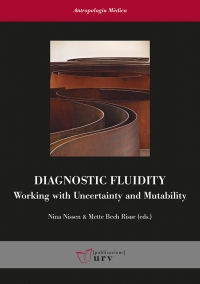Diagnostic procedures are emblematic of medical work. Scholars in the field of social studies of medicine identify diverse dimensions of diagnosis that point to controversies, processual qualities and contested evidence. In this anthology, diagnostic fluidity is seen to permeate diagnostic work in a wide range of contexts, from medical interactions in the clinic, domestic settings and other relations of affective work, to organizational structures, and in historical developments. The contributors demonstrate, each in their own way, how different agents ‘do diagnosis’, highlighting the multi-faceted elements of uncertainty and mutability integral to diagnostic work. At the same time, the contributors also show how in ‘doing diagnosis’ enactments of subjectivities, representations of cultural imaginaries, bodily processes, and socio-cultural changes contribute to configuring diagnostic fluidity in significant ways.
Diagnostic Fluidity: Working with Uncertainty and Mutability
Informació addicional
- Autor: Nina Nissen & Mette Bech Risør (eds.)
- Any de publicació: 2018
- Editorial: Publicacions URV
- Col·lecció: Antropologia Mèdica, 28, 1a ed.
- Pàgines: 260
- Mida: 14,8 x 21 cm
- Enquadernació: Rústica
- ISBN: 978-84-8424-663-3
- Llengua: Anglès
Publicat a
Antropologia Mèdica
Etiquetat com
©
2007 - 2025
Publicacions URV



